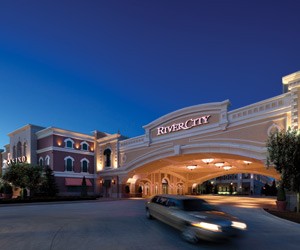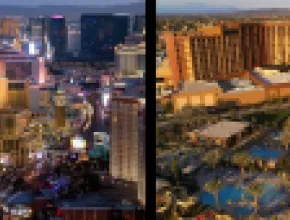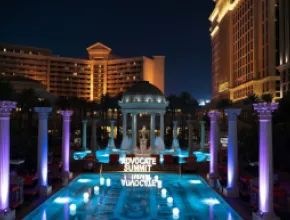While the Heartland might not be seeing the casino expansion activity of a few years ago, casino resorts with entertainment and multipurpose event centers continue to debut and expand.
This past summer, Illinois’ 10th and Iowa’s 18th commercial casino debuted. Construction on Missouri’s 13th commercial casino is under way. Kansas, the newest commercial casino state, has one casino operating and two under construction.
New meetings options are also appearing in the growing Native American casino market. According to the National Indian Gaming Commission, last year the 119 gaming facilities in its Midwest region pulled in $4.45 billion in gaming revenues, up 1.5 percent from the year before.
Illinois
Illinois commercial gaming revenues dropped 4.2 percent last year to $1.37 billion following an 8.9 percent drop in 2009, according to the American Gaming Association (AGA).
The Prairie State has 10 dockside casinos, all on rivers. Six of its casinos, together with five in Indiana, form the Chicagoland market, the country’s third-largest commercial casino market after Las Vegas and Atlantic City. Chicagoland gaming revenues totaled $2.057 billion in 2010, down from $2.092 billion in 2009.
In May, before recessing for the summer, Illinois lawmakers passed a bill that would give the state five more casinos. Designed to boost local economies, the measure would also add slots at racetracks and Chicago’s airports. A decision is expected from Gov. Pat Quinn this fall.
Cities that would get them are Chicago, Danville, Rockford, Park City and an unnamed Chicago southern suburb.
The $445 million Rivers Casino, Illinois’ 10th casino, opened in Des Plaines, 16 miles from downtown Chicago, on July 18. Built by Midwest Gaming and Entertainment, LLC, it has over 1,000 slots, 48 table games, half a dozen dining outlets and two entertainment venues. It claims to be the nation’s first casino to apply for LEED certification.
Midwest Gaming was chosen in 2008 for the unused 10th casino license, dormant since 1997 and mired in legal disputes.
“Rivers will raise the bar for gaming and entertainment in the Midwest,” says Greg Carlin, Rivers Casino CEO. “We have created a unique and exciting experience that will appeal to enthusiastic gamers, entertainment seekers, tourists and conventioneers.”
In Joliet, 45 minutes southwest of Chicago, Penn National Gaming recently rebranded the former 100-room Empress Casino, now the Hollywood Casino Joliet. The property unveiled a new $65 million, Art Deco-themed pavilion that expands dining and entertainment choices.
In April, Delaware North Companies completed the $180 million purchase of Jumer’s Casino & Hotel in Rock Island. Opened in December 2008, the 1,100-slot Jumer’s replaced a riverboat casino and includes 24 table games, a 205-room hotel, a multipurpose events center for up to 600 people, four restaurants, a nightclub and a sports bar.
Indiana
Indiana’s gaming revenues of $2.79 billion last year were down less than .5 percent from 2009, which showed a 4.9 percent increase over 2008, according to AGA. Revenues in 2009 were boosted by two new racinos (racetrack casinos), the state’s first. Hoosier Park Racing and Indiana Downs both had their first full year of casino operations in 2009.
The Hoosier State has one land-based and 10 lake- and river-based casinos. Among them are five Chicagoland properties along Lake Michigan, including Horseshoe Hammond and Blue Chip Casino, Hotel & Spa, which have undergone major expansions in recent years.
Doubling its size, Horseshoe Hammond completed a $500 million expansion in summer 2008, increasing its slot count to 3,200 and adding a 4,000-seat entertainment facility and new restaurants. In early 2009, Boyd Gaming completed a $103 million expansion of the Blue Chip in Michigan City by adding 302 rooms, a spa and an event center.
Two of four casinos in the southeast on the Ohio River have undergone major renovations and rebrandings in the past few years. In 2009, the 300-room Hollywood Casino Lawrenceburg, formerly Argosy, completed a $300 million renovation and expansion, and in 2008, the 503-room Horseshoe Southern Indiana, formerly Caesars Indiana, completed a $53 million renovation.
In April, Full House Resorts purchased Grand Victoria Casino & Resort on the Ohio in Rising Sun. The property features a 1,300-slot riverboat casino, a 201-room hotel, a 12,000-square-foot theater and an 18-hole golf course.
“We are excited to bring the Grand Victoria into the Full House Resorts family,” says Andre Hilliou, Full House chairman and CEO. “With our experience and knowledge in managing local and regional properties, we believe we can further improve the Grand Victoria’s profitability.”
Indiana’s only land-based casino is the $500 million French Lick Resort in Southern Indiana, which began opening in phases in 2006. It has 686 rooms in two expanded historic hotels and 115,000 square feet of meeting space. Its two golf courses this year made Golf Digest’s list of America’s 100 Greatest Public Courses.
Iowa
Iowa’s gaming revenue declined 0.7 percent last year to $1.37 billion, following a 2.8 percent decline in 2009. Previously, the Hawkeye State experienced several years of substantial revenue growth that came with casino expansion.
Iowa currently has 14 riverboat and land-based casinos, three racinos and three Native American casinos.
Its newest facility, the $120 million Grand Falls Casino Resort, opened in early June near Larchwood in northwest Iowa near the South Dakota border. It features an 87-room hotel, three restaurants, a 1,200-seat events center and a casino with 900 slots and 24 table games. An 18-hole golf course is expected to open in 2013.
Kansas
The Sunflower State got the first of its four proposed commercial casinos in December 2009 with the opening of the $48 million, 584-slot Boot Hill Casino & Resort in Dodge City. Scheduled for completion this December, a second phase will add a 124-room hotel, a spa, more restaurants and double the amount of gaming space.
The casinos, one in each of four regions, were authorized by 2007 legislation. Two more casinos are under construction.
Through a joint venture with International Speedway Corp., Penn National Gaming is building a casino at Kansas Speedway, west of Kansas City, Kan. Slated to open early next year, the $300 million, 2,300-slot Hollywood Casino at Kansas Speedway will include 28,000 square feet of restaurants and entertainment. A second phase will feature a hotel.
In February, Iowa-based Peninsula Gaming began work on the $280 million Kansas Star Casino and Entertainment Center in Mulvane, 17 miles south of Wichita. The first phase, set for completion nearly next year, will include a casino and restaurants, while later phases will feature 300 hotel rooms and event and equestrian centers.
Kansas has five Native American casinos, including the 297-room, 1,000-slot Prairie Band Casino & Resort in Mayetta near Topeka, which has a 12,000-square-foot events center.
Michigan
The Great Lakes State has three commercial casinos, all in Detroit, which had gaming revenues of $1.38 billion last year, a 3 percent increase over 2009 when there was a 1.5 percent revenue drop.
The three are MGM Grand Detroit, with a 30,000-square-foot event center; Greektown Casino Hotel, with 25,000 square feet of meeting space; and MotorCity Casino Hotel, which has meeting space that includes an 11,890-square-foot ballroom and a 1,200-seat theater.
Along with casino expansions, each of the three opened 400-room hotels between 2007 and early 2009. The original casinos opened in 1999 and 2000.
Michigan has around 20 Native American casinos, almost all in the north.
Two years ago the Nottawaseppi Huron Band of the Potawatomi opened FireKeepers Casino east of Battle Creek. In May, the tribe broke ground on an expansion scheduled for completion in fall 2012 that includes a 242-room hotel and a 2,000-seat multipurpose event center.
Gun Lake Casino, western Michigan’s newest casino, held its grand opening last February. Located between Grand Rapids and Kalamazoo and owned by the Gun Lake Tribe, the $165 million facility features 1,450 slots, 28 table games and several dining and entertainment outlets.
At Four Winds Casino Resort in New Buffalo, 75 miles east of Chicago, construction is under way on an additional 250 hotel rooms and a 1,600-seat event center expected to be completed in summer 2012. Owned by the Pokagon Band of Potawatomi Indians, the property currently consists of a 3,000-slot casino, four restaurants and a 165-room hotel.
“The expansion validates the continued success we have had since it opened in August 2007,” says Matt Wesaw, Pokagon Band chairman. “The hotel expansion and event center also fulfill the vision we had for the property,”
Minnesota
The Land of 10,000 Lakes has more than 30 Native American casinos.
The Red Lake Band of Chippewa Indians operates three casinos in northern Minnesota. Last year, its Seven Clans Red Lake Casino added a 40-room hotel and an event center seating 400.
Other meetings-ready casino resorts in Minnesota are the 600-room Mystic Lake Casino Hotel near the Twin Cities; the 494-room Grand Casino Mille Lacs in Onamia; the 281-room Grand Casino Hinckley; the 390-room Shooting Star Casino Hotel in Mahnomen; the 89-room Prairie’s Edge Casino Resort in Granite Falls; the 480-room Treasure Island Resort & Casino in Red Wing; and the 250-room Black Bear Casino Resort near Duluth.
Missouri
The Show-Me State has 12 riverfront casinos, including four each in the St. Louis and Kansas City metro regions. According to AGA, Missouri’s gaming revenue increased 3.5 percent to $1.79 billion last year, following a 2.9 percent increase in 2009.
Last year, Pinnacle Entertainment opened the $380 million River City Casino overlooking the Mississippi in Lemay, 10 miles south of downtown St. Louis.
Pinnacle also operates the Lumiere Place casino hotel complex in downtown St. Louis. It features a 2,000-slot casino, which debuted almost four years ago together with a 200-room Four Seasons hotel, and an existing 294-suite hotel that became HoteLumiere.
Last December, the Missouri Gaming Commission awarded a gaming license to Isle of Capri Casinos for a property in Cape Girardeau, a college town on the Mississippi 115 miles southeast of St. Louis. The company broke ground in March on the $125 million Isle Casino Cape Girardeau, which is set to open late next year with 1,000 slots, 28 table games, three restaurants and a 750-seat event center.
“It’s a game-changer for us, not only for revenues but with the 1 million predicted visitors,” says Cape Girardeau Mayor Harry Rediger. “We’re excited about that. We are going to grow and be a different city than we are today.”
Among the five Kansas City casinos is the 184-room Ameristar Casino Hotel Kansas City, which has meeting space for up to 450 people. Last year, it announced that 100 rooms would be added in a $14 million expansion targeted for a fourth-quarter 2011 completion.
Just outside Kansas City in Riverside, the Argosy Casino Hotel & Spa offers over 18,000 square feet of meeting space, a full-service spa and other amenities.
North Dakota
North Dakota’s 13 Native American gaming facilities include the 124-room Spirit Lake Casino & Resort in St. Michael, which completed a renovation and expansion early last year that featured two new ballrooms, each seating 200, a new executive conference room and a renovated lobby and auditorium
Wisconsin
Wisconsin’s newest casino, the Legendary Waters Resort & Casino, opened in Bayfield on the Red Cliff Reservation, replacing a smaller casino. The $23.5 million resort includes a casino, a 48-room hotel and 7,500 square feet of event and conference space seating up to 300.
Meetings-ready Wisconsin casinos include the Oneida Nation’s 408-room Radisson Hotel & Conference Center in Green Bay and the 315-room Ho-Chunk Casino Hotel & Convention Center in Wisconsin Dells, each with about 30,000 square feet of meeting space.
Tony Bartlett has been writing for travel industry publications for over 20 years.






